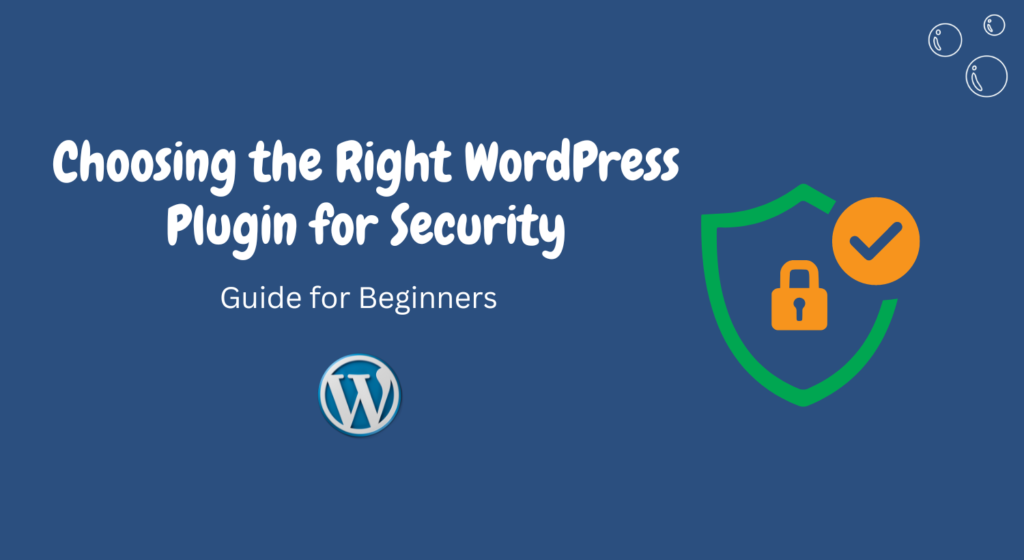When it comes to managing your WordPress website, ensuring its security is paramount.
With the vast array of plugins available, choosing the right one for enhancing your website’s security can be a challenging task.
This article will guide you through essential tips to help you make an informed decision and safeguard your online presence effectively.
1. Understand Your Security Needs
Before diving into the world of WordPress security plugins, take a moment to understand your specific security requirements.
Are you looking to protect against brute force attacks, malware, or both?
Do you need a firewall or monitoring capabilities? By identifying your needs, you can narrow down your search and choose a plugin that aligns with your objectives.
2. Research Thoroughly
With countless security plugins available, it’s vital to conduct thorough research. Read reviews, check ratings, and delve into user experiences.
A reputable plugin should have positive feedback, consistent updates, and a strong user base.
Additionally, verify if the plugin developer offers reliable customer support to address any issues that might arise.
3. Compatibility and Updates
WordPress regularly releases updates to enhance security and functionality.
Therefore, it’s crucial to choose a security plugin that remains compatible with the latest WordPress version.
A reliable plugin developer will promptly release updates to ensure their plugin’s effectiveness against evolving security threats.
4. Performance Impact
While security is paramount, you don’t want a plugin that slows down your website’s performance.
Opt for a security plugin that is optimized for speed and doesn’t significantly affect your site’s loading time.
A slow website can lead to a poor user experience and negatively impact your search engine rankings.
5. Features and Customization
Consider the features the security plugin offers. Look for features such as malware scanning, firewall protection, login attempt monitoring, and two-factor authentication.
Additionally, the ability to customize the plugin’s settings according to your website’s needs is a valuable feature to have.
6. Regular Audits and Monitoring
A robust security plugin should provide regular security audits and real-time monitoring.
This helps you stay informed about potential vulnerabilities and take immediate action to prevent security breaches. Choose a plugin that offers comprehensive reporting and alerts.
7. Reputation and Developer
Opt for plugins developed by reputable sources.
Established developers have a track record of creating reliable and secure plugins. Avoid using plugins from unknown or unverified developers, as they might compromise your website’s security.
8. User-Friendly Interface
A user-friendly interface is essential for effectively managing your security settings.
Choose a plugin that offers an intuitive dashboard and clear navigation. This ensures that even users with limited technical expertise can handle the security aspects of their website.
9. Customer Support
In case you encounter any issues or have questions about the plugin’s functionality, reliable customer support is invaluable.
Look for plugins whose developers provide prompt and helpful customer support through various channels.
10. Free vs. Premium Plugins
While free security plugins can offer basic protection, premium options often provide advanced features and dedicated support.
Depending on your website’s complexity and security requirements, assess whether investing in a premium plugin is worth the added benefits.
11. Regular Backups
While not all security plugins directly offer backup features, it’s advisable to choose a plugin that is compatible with reliable backup solutions.
Regular backups ensure that you can restore your website in case of a security breach or data loss.
12. Read Plugin Documentation
Before finalizing your choice, take the time to read the plugin’s documentation.
This will provide insights into installation, configuration, and best practices for maximizing the plugin’s security benefits.
13. Avoid Plugin Overload
While enhancing security is essential, installing too many plugins can lead to compatibility issues and security vulnerabilities.
Focus on selecting a comprehensive security plugin instead of relying on multiple plugins with overlapping features.
14. Stay Informed
The field of cybersecurity is ever-evolving.
To effectively safeguard your website, stay informed about the latest security trends and threats.
A good security plugin should align with current industry best practices.
15. Regular Updates and Testing
After installing a security plugin, don’t forget to routinely update it and conduct thorough testing.
Regular testing ensures that the plugin is functioning as intended and effectively protecting your website.
In conclusion, choosing the right WordPress security plugin is a critical step in safeguarding your website from potential threats.
By understanding your needs, researching thoroughly, and considering factors like compatibility, performance, and features, you can make an informed decision.
Remember that security is an ongoing process, so stay vigilant, update your plugin regularly, and prioritize the safety of your online presence.
FAQs
- What is the best free security plugin for WordPress?While there are several good options available, “Wordfence Security” and “Sucuri Security” are popular free choices known for their reliability.
- Are premium security plugins worth the investment?Premium plugins often offer advanced features and dedicated support, making them worthwhile for websites with complex security needs.
- Can I use multiple security plugins simultaneously?It’s generally not recommended, as multiple plugins might conflict with each other and cause compatibility issues.
- How often should I update my security plugin?It’s advisable to update your security plugin as soon as new updates are available to ensure you’re protected against the latest threats.
- What should I do if my website gets compromised despite having a security plugin?If your website is compromised, disconnect it from the internet, restore it from a backup, and seek professional assistance to identify and rectify the vulnerability.


